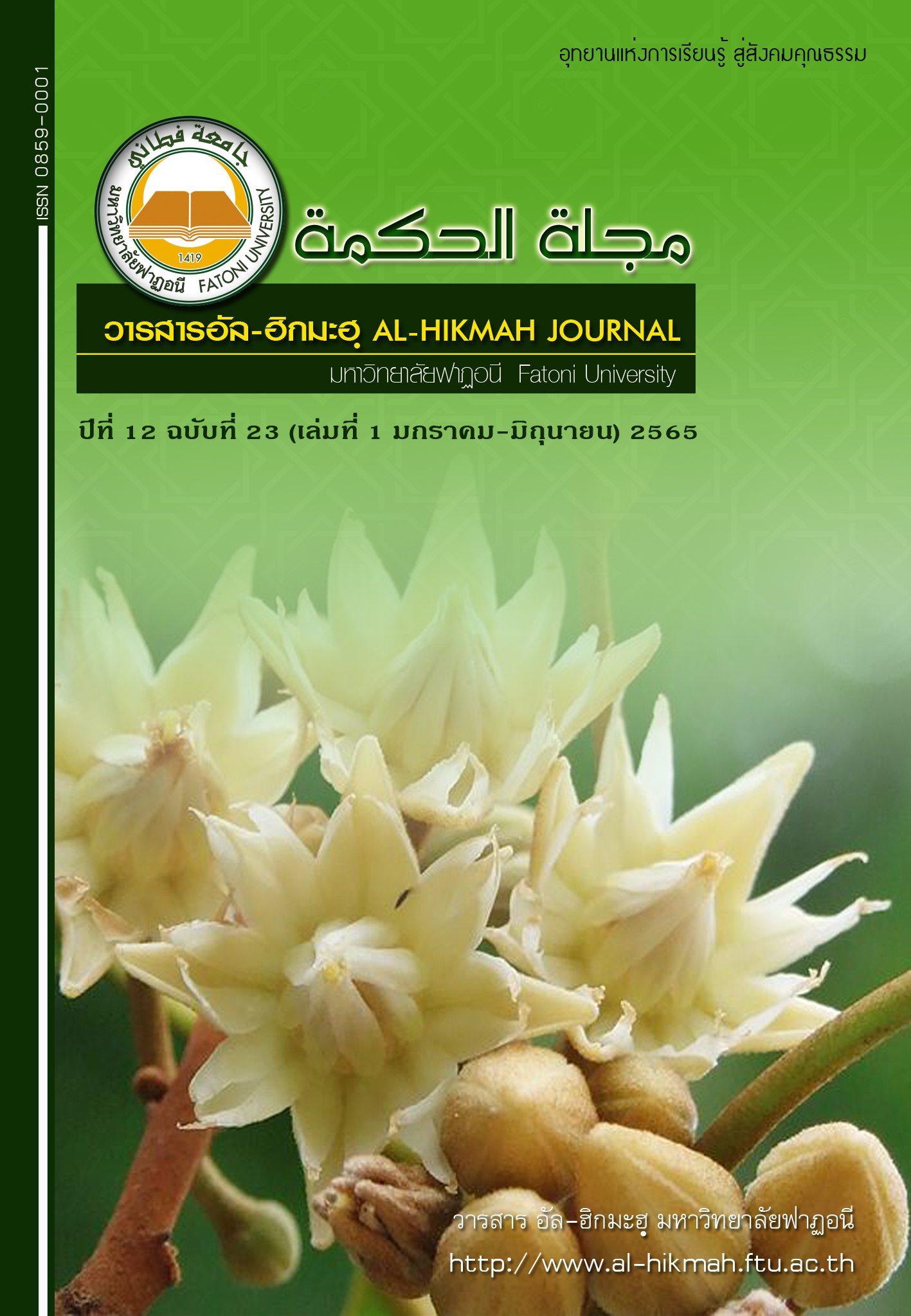การพัฒนากิจกรรมการท่องจำอัลกุรอาน โดยใช้เรื่องเล่าในอัลกุรอาน (Qisas al-Qur’an) เพื่อสร้างพัฒนาการทางด้านสติปัญญาของเด็กปฐมวัย โรงเรียนบ้านฝาง จังหวัดปัตตานี
Keywords:
ท่องจำอัลกุรอาน, เรื่องเล่า, ปฐมวัย, พัฒนาการทางด้านสติปัญญาAbstract
The purpose of this research is (1) to develop Quranic memorization activities by using Quran stories (2) to compare the achievements of memorizing the Quran by using Quran stories (3) to study the development of intellectual of early childhood. The sample group used in this research study was boys and girls in early childhood year 3, semester 1 of the academic year 2020, Ban Fang School, Yaring District, Pattani Province, for 1 classroom totally 24 students.
The results of the study showed that 1) the development of Quran memorization activities using Quran stories to create intellectual development of early childhood at Ban Fang School, Yaring District, Pattani Province There are three steps in the development process for activities: (1) Content quality assessment which the result of the assessment is at the highest level (2) Assessment of media quality for Quran memorization activities Using stories in the Quran (Quran stories) to develop the intellectual development of early childhood. The result of the assessment was at the highest level. (3) Quality Assessment of Quranic Memorization Development Plans Using stories in the Quran (Quran stories) to develop the intellectual development of early childhood. The result of the assessment was at the highest level. 2) Quran memorization achievement by using stories in the Quran (Quran stories), it was found that the student's achievement after studying higher than pre-study achievement statistically significant at the .05 level. 3) Intellectual development results were higher than pre-school achievements.The statistical significance at the .05 level. Conclusions of this study showed that the learners had improved in memorizing the Quran through stories in the Quran well, have good intelligence Content savvy, interactive, fun, good attitude, and enthusiastic about learning. Learners can take lessons back to learn or review anywhere without limiting their learning space.
References
กระทรวงศึกษาธิการ. (2560). หลักสูตรการศึกษาปฐมวัย พุทธศักราช 2561 . กรุงเทพ: ผู้แต่ง.
นิติธร ปิลวาสน์. (2555). “ภาษาแรกเริ่ม (Emergent Literacy)” .(20 มีนาคม 2564). จากอินเตอร์เน็ต. http://www.kruchiangrai.net
บุญเลี้ยง ทุมทอง. (2556). ทฤษฎีและการพัฒนารูปแบบการจัดการเรียนรู้(Theories and Development oe instrutional model. ขอนแก่น: มหาวิทยาลัยขอนแก่น.
วรนาท รักสกุลไทย และนฤมล เนียมหอม. (2549). การจัดประสบการณ์เพื่อพัฒนาเด็กปฐมวัยด้านภาษา. ใน พัชรี ผลโยธิน และคณะ. ประมวลสาระชุดวิชาการจัดประสบการณ์สำหรับเด็กปฐมวัย หน่วยที่ 7-11. นนทบุรี: มหหาวิทยาลัยสุโขทัยธรรมธิราช.
ยาสือนิง มะเด็ง. (2564, มกราคม 11). การท่องจำอัลกุรอานในระดับปฐมวัย. (มุมีนะห์. มูซอ, Interviewer)
รัตานซารี เจะอาแว. (2564, มกราคม 11). หลักสูตรบูรณาการอิสลาม ในระดับปฐมวัย.
(มุมีนะห์ มูซอ, Interviewer)
สำนักงานคณะกรรมการการศึกษาขั้นพื้นฐานกระทรวงศึกษาธิการ. (2553). หลักสูตรอิสลามศึกษาตามหลักสูตรแกนกลางขั้นพื้นฐาน พ.ศ.2551. กรุงเทพ: โรงพิมพ์สหกรณ์การเกษตรประเทศไทย จำกัด.
สํานักงานเลขาธิการสภาการศึกษา. (2552).รูปแบบการสงเสริมนิสัยรักการอานในเด็กอายุ 4-5 ป โดยพอแมผู เลี้ยงดูเด็ก. กรุงเทพฯ: พริกหวานกราฟฟค
อารี สันหฉวี. (2552). การสอนภาษาไทยแนวสมดุล. . กรุงเทพ: สมาคมเพื่อการศึกษาเด็ก.
อิบราฮีม ณรงค์รักษาเขต. (2551). ปรัชญาการศึกษาอิสลาม. สงขลา: หาดใหญ่กราฟฟิก.
อิสมาอีลลุตฟี จะปะกียา. (2558). Halaqatul Quran. ปัตตานี: มหาวิทยาลัยฟาฎอนี.
Mahjub, Abbas. (2006). Usul Al-Fikr Al-Tarbawiah Fi Al-Islam. Jordan: Alim
Al-Kutub Al-Hadith.
Ulwan, N., Abdullah. (2008). Tarbiah Al-Awlad Fi Al-Islam. 42 nd. Ed. Egypt: Dar Al-Salam.
Downloads
Published
How to Cite
Issue
Section
License
Copyright (c) 2022 Al-HIKMAH Journal

This work is licensed under a Creative Commons Attribution-NonCommercial-NoDerivatives 4.0 International License.



